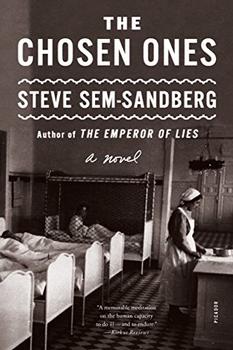Summary | Excerpt | Reviews | Readalikes | Genres & Themes | Author Bio

A Novel
by Steve Sem-Sandberg
March 1938 The wireless was always on in the Haidinger household. It was silent only if the battery had run down and then Adrian had to take it to an electrician in Schwechat to be charged. The batteries were heavy and there was always at least one to carry each way, the discharged one that he brought to Schwechat and the fully recharged one that was needed back home. The Haidinger and Pawlitschek families called a ceasefire when it was time to gather around the radio. Together, they listened to speeches by Mr Schuschnigg, the Federal Chancellor, and to the debates about the betrayal of Austria, and were excited to hear the news from Steiermark about the Heimwehrverbande, the local Territorial Army unit that refused to take sides against their German brothers. The day Hitler came marching in, a group of them went off to Heldenplatz: Mr Haidinger, Mr Christian, who was a neighbour and a member of the Patriotic Front, and old Mr Pawlitschek, the father of the man with the missing arm. Pawlitschek senior was a large man with a stiff, bristly moustache. He was a convinced Nazi, Mrs Haidinger said, as if, even among the NSDP members, some were less than wholly convinced. Adrian was allowed to come along on the outing because they needed someone to carry the provisions. They took the tram to Schwarzenbergplatz and walked up Ringstrasse, past the Imperial Hotel where old Mr Pawlitschek insisted that Hitler and his entourage were quartered. When they passed the Opera House, he also pointed out that jumped-up Jews were the only ones parading around in there. The pavements of the wide avenue were crowded with people waving banners and handkerchiefs, shouting Heil Heil Heil! all the time. By the time the group got close to Heldenplatz, the crowd was too dense and they had to cross to the museum side and finally, after re-crossing the tram rails, they once more ended up so far back that all they could see of Hitler was a small, grey blob on the distant balcony. But I did see him, Adrian would say afterwards. Well, sort of. He had been overwhelmed by hearing the Führer's voice booming through the loudspeakers high above everyone's heads, even though the words of the great man's speech were almost impossible to make out because the sound bounced all over the place and was anyway drowned in the wild noise made by the tens of thousands of voices shouting and screaming while people waved their swastika-emblazoned banners and stretched their arms straight up in the air to return his salute; but, Adrian said, all he could think of was how to place his feet so that he could quickly bend down and then get out from under if he risked being trampled on. A few weeks later, his form teacher in the school at Münnichplatz was replaced. The new one, a Mr Bergen, had the title 'Magister' and was probably a convinced Nazi, perhaps even a party member. He started to pick on Adrian straightaway. There was a poem by Ottokar Kernstock that should be read with a special kind of solemn emphasis at the end of each sentence and Mr Bergen would read it aloud, standing by the teacher's desk, and then all the pupils had to repeat after him:
Das Hakenkreuz im weissen Feld
Auf feuerrotem Grunde
Gibt frei und offen aller Welt
Die frohgemute Kunde
Wer sich um dieses Zeichen schart
Ist deutsch mit Seele, Sinn und Art
und nicht bloss mit dem Munde.1
Over and over again, Adrian was told to stand in front of the class and recite the poem by heart and, every time, he lost track. Besides, the way he pronounced some of the lines made his reading unintentionally come across as a comic turn, perhaps especially when he got to 'um dieses Zeichen schart'. By then, everyone was in fits of laughter and Mr Bergen's face had flushed as red as the Nazi banner. It didn't take long for the form teacher to make a personal call to Mr and Mrs Haidinger. He told them that innate stupidity clearly made the bastard boy they had adopted unteachable. Mr Bergen added that they had actually been wrong to take him on. The teacher seemed to know how it had happened and had presumably heard it from someone else. The foster parents weren't likely to go unpunished for their bad judgement. Mr Haidinger took it out on Adrian afterwards. He went for the most straightforward approach, ordered the boy to strip to the waist and come along to the tool shed where the spare rabbit hutches were kept and where, just as he would when flaying a dead rabbit, he hung Adrian on a hook on the wall using the rope tying his wrists, then took his belt off and whipped the half-naked child until not only Adrian, but Haidinger too, was screaming insanely. Light seeped into the shed and Adrian saw Helmut watching them, eating one of Mrs Haidinger's titbits and smiling in exactly the same nervously submissive way as their father when he was scared.
Excerpted from The Chosen Ones by Steve Sem-Sandberg. Copyright © 2016 by Steve Sem-Sandberg. Excerpted by permission of Farrar, Straus & Giroux. All rights reserved. No part of this excerpt may be reproduced or reprinted without permission in writing from the publisher.
Your guide toexceptional books
BookBrowse seeks out and recommends the best in contemporary fiction and nonfiction—books that not only engage and entertain but also deepen our understanding of ourselves and the world around us.